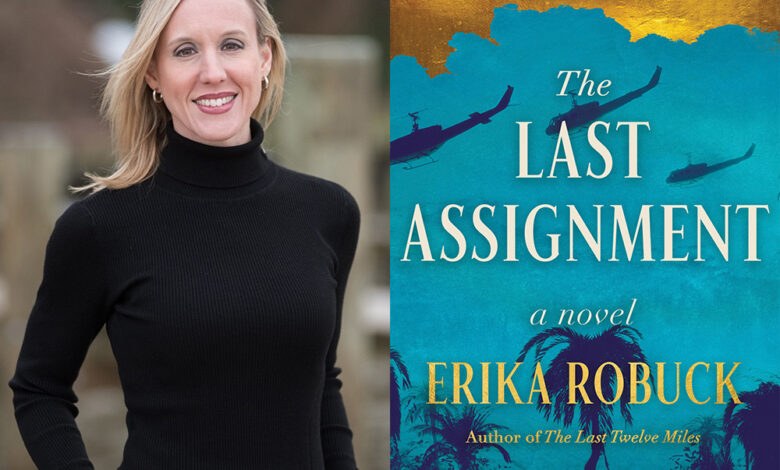Q&A: Erika Robuck, Author of ‘The Last Assignment’

We chat with author Erika Robuck about The Last Assignment, which follows the perilous and awe-inspiring true story of award-winning photojournalist Dickey Chapelle as she risks everything to show the American people the price of war through the lens of her camera.
Hi, Erika! Can you tell our readers a bit about yourself?
I was born and raised in Annapolis, Maryland, and still live nearby. I’m a wife, mother of three sons, teacher, writer, and photography enthusiast. You can find me boating on the Severn River, reading and taking pictures along its shores, playing backyard volleyball, and attending St. Mary’s Church.
When did you first discover your love for writing and stories?
From the moment I could read, I started writing. My first play was composed at age seven, and I’ve never looked back. Reading is inhaling for me and writing is exhaling. I must have both.
Quick lightning round! Tell us:
- The first novel you ever remember reading: James and Giant Peach, by Roald Dahl
- The one that made you want to become an author: Beloved, by Toni Morrison
- The one that you can’t stop thinking about: Father Elijah: An Apocalypse, by Michael O’Brien
Your latest novel, The Last Assignment, is out now! If you could only describe it in five words, what would they be?
Woman, with camera, exposes war.
What can readers expect?
Readers can expect to be endeared to and confounded by intrepid combat correspondent Georgette “Dickey” Chapelle as she navigates international conflict from the front lines in order to show readers the human cost of war.
Where did the inspiration for The Last Assignment come from?
My relatives in the military and my lifelong proximity to the U. S. Naval Academy, Fort Meade, and DC Metro intelligence agencies have always engaged my interest. Recent years have sharpened that to a mission to find women in the shadows of war and intelligence history whose stories beg to be told. Dickey has long been haunting me, through her photographs of war, and I finally relented to her prodding.
Were there any moments or characters you really enjoyed writing or exploring?
Dickey Chapelle is truly one of a kind, and I love her. For years, I avoided her story because of heavy subjects and themes but quickly learned that whether she was in a Manhattan bar or the jungles of revolutionary Cuba, Dickey was a delight to journey with and a light in dark places. She inspires me every day.
Did you face any challenges whilst writing? How did you overcome them?
Dickey’s career spanned seven wars, from WWII through Vietnam. I am not a biographer and that was too overwhelming. I had to find three settings for our hero’s journey that were united in time and in theme. Research crystalized that for me, and I chose the Hungarian Revolution, the Cuban Revolution, and Vietnam. These conflicts not only felt like fresh territory in fiction, but they were engaging to research and portray.
Can you tell us a bit about your research process?
I start with biographical material about the subject. If I become adequately obsessed, I commit and I move to online and in person archival research. I start with material about the subject, and move closer until I’m reading articles, letters, journals, photographs, interviews, video, and books by the subject, in their own voice. At that point I feel comfortable creating my novel timeline, starting my draft, and writing from the subject’s point of view—in either third person limited or first person.
What’s next for you?
My fascination with women in the shadows of war and intelligence history continues, as does my decade long obsession with Cuba. The two subjects come together in my new work in progress, which I cannot yet disclose.
Lastly, what books have you enjoyed reading this year? Are there any you’re looking forward to picking up?
ISOLA, by Allegra Goodman, absolutely captivated me. It’s a perfect book—exactly what I’m looking for in historical fiction. I’m in awe of it’s beauty.
My TBR pile is staggering, but I’m most looking forward to reading THE STOLEN LIFE OF COLETTE MARCEAU, by Kristin Harmel, and WRITING, CREATIVITY, AND THE SOUL, by Sue Monk Kidd.
Follow Erika on Facebook and Instagram.
